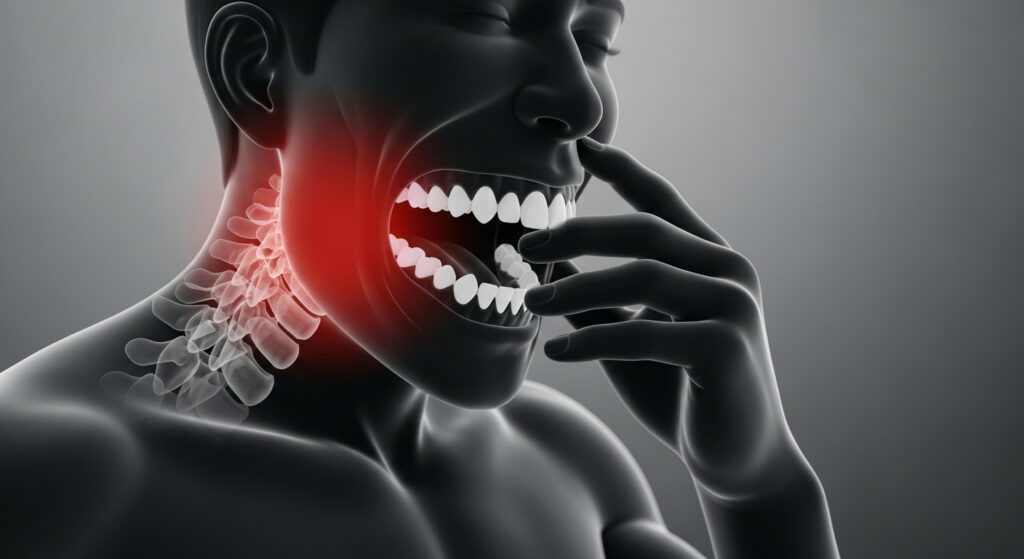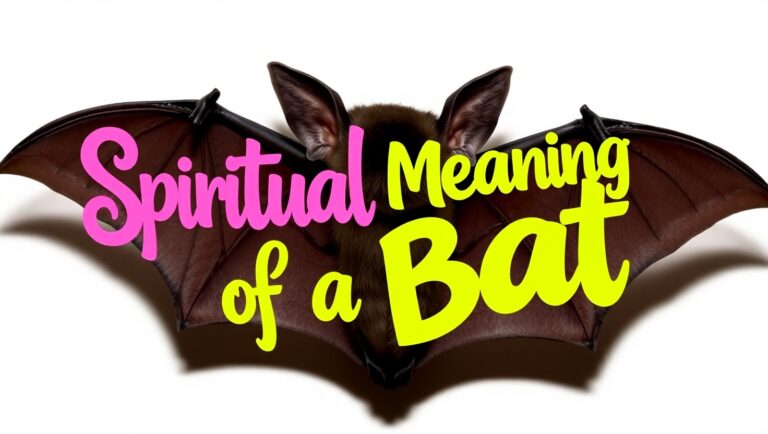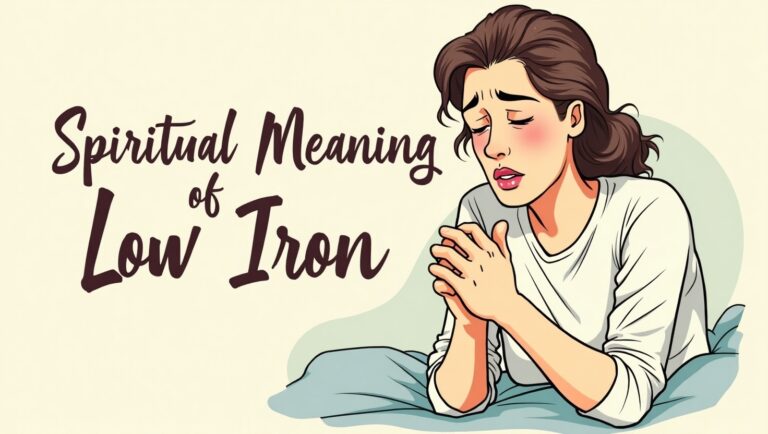Spiritual Meaning of Jaw Pain – Release Emotional Blocks!
Pain in the jaw might be more than just a physical ache. Is there a deeper spiritual lesson behind Spiritual Meaning of Jaw Pain? Many people think that emotional or energy imbalances are reflected in physical ailments.
In a spiritual sense, jaw discomfort represents hidden truths, emotional repression, and impeded communication. It frequently indicates an internal problem or a clogged throat chakra. Restoring energetic flow and promoting healing are two benefits of releasing these tensions.
Follow along as we shortly discuss the connection between jaw discomfort and trauma from previous lifetimes as well as the function of ancestral healing in releasing pent-up emotional energy.
“The jaw is the gatekeeper of our voice. When we silence our truth, it speaks through pain.” – Unknown Spiritual Teacher
Key Takeaways:
- Jaw pain often signals emotional stress or unexpressed feelings.
- Spiritual traditions link jaw pain to communication challenges.
- Throat chakra blockages can manifest as jaw discomfort.
- Healing involves self-expression and emotional release.
- Mindfulness and holistic practices address spiritual causes.
Unraveling the Spiritual Significance of Jaw Pain:
Physical discomfort often indicates more serious problems. Because jaw discomfort is directly related to expression and communication, it stands out. Numerous spiritual traditions argue that our shared thoughts and feelings are reflected in our jaws. Tension arises when we suppress our emotions or words, and it often shows up as jaw pain.
The Body as a Mirror of Spirituality:
In traditional teachings like Chinese medicine and Ayurveda, the body is seen as a map of emotional and spiritual states. The jaw, which is situated near the neck, is in alignment with the throat chakra, which governs communication and truth. This is where obstructions might be uncomfortable. For instance, unresolved disputes or unspoken realities may cause the jaw muscles to clench.
Jaw Hold Tension:
Eating, speaking, and expressing emotions with facial expressions all depend on the jaw. Suppressing your voice due to societal pressure, fear, or humiliation causes energy stagnation. This may result in tightness, discomfort, or chronic pain. For example, someone who avoids confrontation may inadvertently clench their jaw, which might lead to chronic tension.
Spirituality Shapes Physical Symptoms:
Spiritual illnesses often present with physical symptoms. Jaw pain may indicate that you are experiencing emotional or energy issues, such as feeling disconnected or unheard. You may take proactive steps to achieve balance by looking into these connections, such as writing or meditation.
The Significance of Intuition in Interpreting Discomfort:
You may use your intuition to interpret the spiritual significance of jaw discomfort. Observe when the discomfort starts. Does it get more intense during tense discussions or times when you’re doubting yourself? By identifying emotional or spiritual triggers, these hints enable you to successfully address the underlying issue.
Linking the Spiritual and Physical Worlds:
The jaw serves as a link between spiritual and bodily expression because of its close closeness to the neck. Here, pain often indicates a misalignment between your inner reality and your behaviour. You may find holistic healing methods by thinking about this link.
How Emotions Fuel Jaw Pain Spiritually – Top Causes:
Emotions profoundly impact physical health. Stress, anger, or sadness can settle in the body when unexpressed. The jaw, used for communication, often absorbs this tension. Clenching your jaw during stress is a common reaction, but over time, this leads to chronic pain or discomfort.

Stress as a Primary Trigger:
Physical reactions such as bruxism, or clenching of the jaw, are brought on by high levels of stress. This practice often happens unintentionally, particularly while you’re sleeping or focused intently. It represents a spiritual incapacity to let go of control or discharge bottled-up emotions. A person overburdened by job deadlines, for instance, can clench their jaw, indicating the need for a comprehensive approach to stress management.
Repressed Feelings and Persistent Pain:
Tension in the jaw results from suppressing feelings such as fear, anger, or grief. Unconscious clenching may result from avoiding a challenging talk with a loved one. Chronic pain is the outcome of this suppression, which intensifies with time. It’s critical to recognise these trends. Recognise your feelings first, even in private.
Emotional Buildup and Its Physical Impact:
Unexpressed emotions create a feedback loop. The more you suppress, the more tension accumulates in the jaw, potentially leading to temporomandibular joint (TMJ) disorders. For instance, someone feeling silenced at work may experience recurring jaw pain. Open communication or creative outlets can break this cycle.
The Function of Emotional Awareness:
Being emotionally aware aids in the detection of jaw discomfort. Record your feelings and the times when pain flares up in a notebook. For instance, discomfort during family disputes might indicate unspoken annoyance. You may let go of your emotions in a healthy way by being aware of these triggers.
Recognising Emotional Trends:
Examine if certain emotional states, such as resentment or worry, are correlated with jaw discomfort. Pain after disagreements, for example, might be a sign of repressed rage. You may address the emotional and spiritual sources of pain by keeping track of these patterns.
More For You: What’s the Hidden Spiritual Meaning of Itching Head?
Throat Chakra and Jaw Pain – The Spiritual Connection:
In spiritual practices like yoga, the throat chakra (Vishuddha) governs self-expression and communication. Located near the jaw, it influences how we share our truth. Blockages in this chakra often manifest as physical symptoms, including jaw pain or tightness.
Throat Chakra Blockages:
Fear of speaking out often blocks the throat chakra. Staying silent to avoid conflict at work or home creates energetic stagnation. This can appear as jaw pain, sore throat, or difficulty swallowing. Other triggers include fear of judgment, guilt over past words, or feeling misunderstood.
Balance the Throat Chakra:
Restoring throat chakra balance involves honest communication. Express thoughts in safe spaces, like with a friend or through journaling. Chanting the seed sound “HAM” for 10 minutes daily can clear blockages. This practice promotes energy flow and reduces jaw tension.
Signs of a Blocked Throat Chakra:
Symptoms include difficulty expressing thoughts, frequent misunderstandings, or physical issues like jaw pain. You might feel a lump in your throat or struggle to articulate needs. Recognizing these signs early helps prevent chronic issues.
Practical Steps to Support the Throat Chakra:
Incorporate singing, affirmations, or throat-focused yoga poses (e.g., Fish Pose) to open the chakra. Wearing blue clothing or using blue crystals like aquamarine enhances healing. These steps support emotional expression and reduce jaw pain.
Daily Throat Chakra Practices:
Spend 5–10 minutes daily on throat chakra exercises, like humming or reciting affirmations (“I speak my truth freely”). These practices strengthen communication and prevent energetic blockages that cause pain.
“Speak your truth, even if your voice shakes.” – Maggie Kuhn
Why Stress Drives Jaw Pain Spiritually?
Stress is a pervasive issue, affecting both body and spirit. The jaw often stores stress-related tension, especially through habits like clenching or grinding teeth. Spiritually, this reflects a struggle to release control or express emotions fully.

The Stress-Pain Connection:
Chronic stress disrupts your spiritual core, creating a cycle where physical pain reinforces emotional turmoil. For example, someone facing constant work pressure may clench their jaw, worsening pain with stress. Addressing the root cause through mindfulness breaks this cycle.
Spiritual Effects of Chronic Stress:
Stress blocks energy flow, leading to physical symptoms. The jaw, tied to communication, is vulnerable. Spiritually, this may indicate a need to surrender control or trust your inner voice. Yoga or guided meditation can restore balance and reduce tension.
Breaking the Stress Cycle:
Incorporate daily stress-relief techniques to prevent tension buildup. A five-minute deep breathing exercise—inhaling for four counts, holding for four, exhaling for six—calms the nervous system. Regular practice prevents stress from manifesting as jaw pain.
Long-Term Stress Management Strategies:
Adopt habits like regular exercise, adequate sleep, and time in nature. A weekly walk in a park can ground your energy and promote relaxation. These practices strengthen spiritual resilience, reducing jaw pain.
Stress and Spiritual Alignment:
Stress often signals a disconnect from your spiritual purpose. Reflect on whether your daily actions align with your values. Adjusting your priorities to focus on what matters can reduce stress and its physical effects.
More For You: What Does Spiritual Meaning of Itching Legs?
Unexpressed Emotions – A Major Cause of Jaw Pain:
Bottling up emotions traps energy in the body. The jaw, linked to speech, often bears this burden. Unvoiced feelings like anger, sadness, or frustration can cause jaw clenching, leading to pain over time.
The Impact of Emotional Silence:
Suppressing emotions creates energetic blocks, disrupting the body’s flow. For example, not addressing anger toward a colleague can lead to unconscious clenching, especially during sleep. This tension accumulates, causing discomfort or chronic pain. Over time, these unspoken feelings start to settle in the muscles, particularly in the jaw. This not only affects physical comfort but also leads to emotional stagnation, making it harder to move forward in life.
Release Emotional Blocks:
Express feelings in safe ways. Talking to a friend or therapist eases emotional tension. Writing a letter you don’t send allows processing without confrontation. These practices reduce jaw strain and align you spiritually. Even simple practices like deep breathing while reflecting on your emotions can help. Releasing inner tension allows energy to circulate freely.
Long-Term Effects of Emotional Repression:
Chronic repression can lead to persistent jaw pain or TMJ disorders. Someone who avoids conflict for years may develop severe tightness. Addressing emotions early through communication prevents complications. When emotions stay buried, the body compensates by tightening and guarding, especially in sensitive areas like the jaw. Left unresolved, this can even affect speech, sleep, and general well-being.
Tools for Emotional Expression:
Use art, music, or dance to express emotions nonverbally. Painting your feelings or singing can release trapped energy. These outlets support emotional health and reduce jaw tension.
Such creative tools allow the subconscious to express what words cannot. They tap into healing frequencies and movement, promoting release and clarity from within.
Establishing Safe Spaces for Expression:
Look for settings, such as a support group or therapy session, where you feel at ease discussing your feelings. These areas promote open communication, which eases the emotional strain on your jaw.
Additionally, supportive settings acknowledge your experiences, which is essential for recovery. Speaking your truth without internalising stress is simpler the more emotionally secure you feel.
“The truth will set you free.” – John 8:32, The Bible
Cultural Beliefs-Spiritual Interpretations of Jaw Pain:
Various cultures have different ideas about the spiritual significance of jaw pain, which may lead to more comprehensive therapeutic insights.
Chinese Medicine and Emotional Detox to Jaw Pain:
According to Chinese medicine, the liver meridian, which controls wrath and emotional flow, is energetically connected to the jaw. This kind of pain often indicates internalised displeasure or unexpressed annoyance.
According to practitioners, clenching or soreness in the jaw is a sign of stagnant liver energy. This meridian may be rebalanced and harmony restored with the use of acupuncture, cooling foods like cucumber, or relaxing medicines like chamomile.
An Ayurvedic Perspective on Jaw Pain:
Ayurveda states that an imbalance in the Vata dosha, which is connected to the components of air and space, is often the cause of jaw discomfort. Stress, erratic routines, or worry exacerbate this dosha.
Tightness, cracking, or soreness are signs of a disturbed Vata, which makes joints dry and tense. Discomfort may be reduced by calming this energy with warm oil massages (Abhyanga), eating foods that are grounding, such soups or stews, and practicing stillness.
Communication may be facilitated by healing practices like drumming, smudging with white sage, or interacting with elders. These customs preserve traditional knowledge and encourage emotional equilibrium.
Western Spiritual Views:
Jaw discomfort is often seen from a Western spiritual perspective as a sign of repressed creativity or unsaid realities that need recognition. Tension in your energy might result from suppressing your voice, aspirations, or ambitions.
Emotional release is supported by therapeutic techniques including prayer, expressive writing, and affirmations (e.g., “I speak my truth with confidence”). By promoting clarity, these exercises assist you in bringing your inner truth into harmony with your external manifestation.
Native American Spiritual Knowledge:
The body is revered in Native American cultures as a holy medium through which the spirit expresses its desires. According to this perspective, jaw discomfort is an obstruction in the spiritual communication path, often indicating that feelings or facts are being suppressed.
Elders say that storytelling and personal strength are directly related to the jaw. Restricting this energy is seen as an indication that one is not living in accordance with the truth of their spirit. People might rediscover their inner voice via rituals like vision quests, prayer dances, and sweat lodges.
More For You: What Does an Itchy Index Finger Superstition Mean?
The Best Spiritual Reasons for Jaw Pain You Should Be Aware of:
Jaw strain is often the result of suppressed speech, particularly when people avoid expressing their truth in hazardous situations. Physical pain results from the body communicating what the mind conceals due to this emotional silence, which increases pressure. Anger and other repressed emotions are major contributors to this problem, especially in conflict-averse individuals.

Furthermore, the throat chakra, which is our energy centre for expression, may be blocked by fear of being judged, which exacerbates jaw discomfort. Jaw pain is another indicator of spiritual misalignment, indicating a deeper need to realign behaviour with one’s inner values and life purpose. Self-reflection and candid dialogue are the first steps towards healing.
Jaw stress might result from not pursuing artistic or literary endeavours. These exercises promote spiritual well-being and energy release. Jaw discomfort may be a sign of resistance to life changes, such as a change in relationships or a new work. This stress is lessened by practicing mindfulness to embrace change.
“Your body speaks when your heart is silent.” – Ancient Proverb
Best Spiritual Healing Practices for Jaw Pain Relief:
Healing jaw pain requires addressing body and spirit. Spiritual practices release tension and restore balance.
Meditation for Jaw Relaxation:
Meditation calms the mind and body, creating space for healing. Focus on your jaw while breathing deeply, and visualize tension melting away like ice. A 10-minute daily practice opens energy channels and eases muscle tightness. Over time, this practice retrains your nervous system to respond to stress with calm, not clenching.
Journaling to Release Emotions:
Writing your thoughts helps release suppressed emotions that build physical tension. Free-write for 15 minutes about what’s bothering you without self-editing. This clears mental and energetic blocks, reducing jaw discomfort. Journaling also helps you identify emotional patterns contributing to pain.
Chanting and Sound Therapy:
Sound vibrations are powerful tools for unblocking the throat chakra. Chant “HAM” or sing for 5–10 minutes daily to promote energy flow and uplift your spirit. The resonance created by your voice soothes the jaw and encourages emotional expression.
Energy Healing for Balance:
Reiki or energy healing techniques are effective in releasing energetic blockages. A skilled practitioner can focus on the jaw and throat to restore harmony. Self-Reiki, with your hands resting gently on your jaw, is also effective. These sessions often bring emotional clarity along with physical relief.
Visualization Techniques:
During meditation, visualize blue light soothing and cooling your jaw. Imagine this light dissolving stored tension and opening your throat chakra. This enhances relaxation and promotes deep spiritual healing. With consistent practice, visualization strengthens the mind-body connection.
Affirmations for Empowerment:
Daily affirmations like “I express myself freely” reinforce the energy of open communication. These positive statements help counter fear-based silence that causes jaw pain. Saying them aloud strengthens your belief system and shifts your internal narrative.
How to Identify Spiritual Jaw Pain Triggers Fast?
Identifying spiritual jaw pain triggers quickly begins with tuning into your emotional and physical responses in everyday situations. Notice when your jaw tenses—often, this happens during emotionally charged moments like difficult conversations, suppressing your feelings, or avoiding confrontation.
These instances suggest that your body is reacting to emotional or spiritual misalignment, particularly when you’re not speaking your truth. Keeping a brief journal to track moments of tension can help reveal patterns; for example, jaw pain might consistently arise after interactions where you feel unheard or silenced.
Another effective method is to perform a quick body scan—bring awareness to your jaw and throat and observe any tightness or discomfort, especially when reflecting on stressful events. Additionally, examine your internal dialogue: are you frequently restraining yourself from expressing emotions or opinions due to fear or judgment? This self-silencing often manifests physically through jaw tension.
Holistic Remedies to Soothe Jaw Pain Spiritually:
Holistic treatments target both physical strain and spiritual imbalance, therefore providing strong, natural means to release jaw discomfort. One of the simplest treatments to start with is aromatherapy: diluted essential oils such as lavender or peppermint, when rubbed gently into the jawline using a carrier oil, may help to relax and lower tension.
Aromatherapy for Stress Reduction:
One of the simplest treatments to start with is aromatherapy; essential oils like lavender or peppermint, mixed with a carrier oil and gently rubbed into the jawline, may help to relax the jawline. By diffusing essential oils in your environment, you also create a peaceful setting that encourages spiritual clarity and emotional healing.
Crystal therapy:
stones like blue lace agate or aquamarine speak to the throat chakra and promote expressiveness. One of these stones may be simply placed on your jaw or held during a 10-minute meditation to improve energy balance, harmony, and assist in releasing latent emotions.
Herbal tea for leisure:
Herbal teas including peppermint or chamomile calm the nervous system and inspire emotional discharge, therefore providing internal comfort. A warm cup in the evening helps one relax body and mind, therefore facilitating the release of tension kept in the jaw and support of peaceful sleep.
Breathwork helps to ease tension:
Try the 4-4-6 pattern, inhale for four seconds, hold for four, then exhale for six. Just five minutes of daily practice can reset your stress response, decrease cortisol levels, and ease jaw and facial muscle stiffness.
Healing grounded in movement:
Additionally very important is gentle movement-based therapy such as yoga. While connecting your energy centres, poses like Cat-Cow or Fish Pose remove strain from the neck and jaw. Two to three times a week a brief 15-minute treatment may greatly reduce chronic jaw tightness and increase energy flow.
Sound Healing with Music:
A potent yet subtle therapy for spiritual jaw release is sound healing using music. During meditation or relaxation, listen to soothing music or certain frequencies like 741 Hz, tuned to the throat chakra, to unblock blocked energy pathways and encourage emotional clarity, therefore enabling you to discover your voice and inner peace.
Easily include spiritual healing into your everyday life:
One might easily develop spiritual healing as a habit. Start with five daily minutes for meditation or writing. These behaviours become natural to us. Assemble yourselves with those who support free communication. Join a support group or share emotions with pals. This generates a healing safe environment. Live according to your goal.
Like with honest communication, align behaviour with beliefs. This releases stress and enhances your spiritual centre. Add little spiritual activities as nightly writing or early affirmations. Consistency promotes spiritual development and helps to avoid jaw problems. Track spiritual activities and jaw pain complaints. List triggers or enhancements. This helps refine your routine and stay committed to healing.
FAQs:
Which Feeling Is Stuck in the Jaw?
Sadness, anxiety, and anger are often held in the jaw. When these feelings are not communicated, tension develops. Jaw clenching, for instance, might result from repressing rage during a dispute. Talking or keeping a journal helps in letting go of these feelings.
What Is the Spiritual Meaning of Jaw?
In spiritual traditions, the jaw is a symbol of self-expression and communication. It represents your capacity to express your truth and is connected to the throat chakra. Here, pain often indicates repressed speech or a break from your true self.
Which Feelings Are Connected to Jaw Pain?
Anger, irritation, grief, or fear are often associated with jaw discomfort. Feeling silenced, criticised, or unheard causes these feelings. For example, jaw stiffness may be a sign of animosity stemming from an unresolved quarrel.
What Does Pain in the Jaw Mean?
Jaw discomfort is a sign of spiritual or emotional blocks, which are often connected to sentiments or ideas that are not addressed. It can be a sign of problems with your throat chakra or a desire to connect with your mission. Pain may be reduced by addressing them via spiritual activities.
How Can Jaw Tension Be Released?
Use these techniques to alleviate jaw tension:
- Meditation: To relax the jaw, concentrate on deep breathing for ten minutes.
- Massage: Spend two to three minutes each day gently massaging the jaw.
- Chanting: To open the throat chakra, chant “HAM.”
- Journaling: Express repressed feelings by writing about them.
- Yoga: To relieve stress, try neck-focused positions like Fish Pose.
Conclusion:
Jaw discomfort often conveys a deep spiritual message, indicating repressed feelings, obstructions in the throat chakra, or a lack of connection with your reality. Techniques like journaling, mindful conversation, and meditation help people decompress and regain equilibrium.
For a more comprehensive approach, combine them with medical consultations or physical treatments like jaw massages. Pay attention to your body. Tell the truth. Both your soul and your jaw will be at ease.
Top Most Searches:
- Read More: Raven Symbolism & Spiritual Meaning!
- Read More: Hummingbird Spiritual Meaning – Mystical Power They Hold!
- Read More: What Does Spiritual Meaning of Itching Legs?







